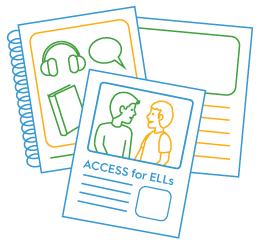Resources/Recursos
Featured Resources



All resources/Todos los recursos
Filter resources by:
Resources/Recursos
Trauma Informed Considerations for Multilingual Learners
As teachers, staff and administrators in school buildings, district offices and educational agencies across the country, we play a critical role in responding to the individual needs of students in our teaching and learning settings. Trauma can be experienced by any student, but for those who are also learning English as an additional language or who are adjusting to a new culture, these experiences add another dimension of care to be addressed by educators. Through this focus bulletin, readers will be introduced to a research based guide for working with multilingual learners who may benefit from trauma informed practices, including discussions on special populations, the sharing of empowering and engaging strategies, a raising of awareness about prompting adverse behaviors, and building rapport across whole school, student and family networks.
Resource Details View Download NowReleased May 2024
Examining the Impact of COVID-19 on English Learners' Proficiency and EL Subgroup Disparities
This webinar examines ways in which large-scale assessment data can be used to extract important, practical and useful insights on average patterns and high-level trends in English learners’ education and academic outcomes.
Resource DetailsReleased May 2024
Administrator Supplement: WIDA ELD Standards Framework Implementation, What, Why, and How?
This webinar offers guidance on using the administrator supplement for the implementation guide for the WIDA English Language Development Standards Framework, 2020 Edition.
Resource DetailsReleased May 2024
Can Do Philosophy
This document articulates the WIDA Can Do Philosophy, which expresses the foundational belief that every learner brings valuable contributions to everything they do.
Resource Details View Download NowReleased May 2024
Investigación-acción: Un catalizador para la enseñanza y el aprendizaje integral en contextos multilingües
Este resumen informativo de WIDA presenta la Investigación-acción — un concepto que resalta el trabajo mutuo entre investigadores y educadores para abordar los desafíos en el salón de clases — lo que alienta a los maestros a utilizar sus voces para hacer contribuciones significativas al campo, ya sea a través de esfuerzos colaborativos o independientes.
Resource DetailsReleased May 2024
Validating a new writing scoring scale using multi-faceted Rasch analyses
This Technical Report describes a validation study of the newly developed WIDA ACCESS writing scoring scale by examining its feasibility in differentiating student ability and practical scoring use. TR-2024-1.
Published: April 2024
Author: Ping-Lin Chuang
Additional authors: Mark Chapman, Kyoungwon Bishop, Ahyoung Alicia Kim
Released April 2024
WIDA Screener Interpretive Guide for Score Reports
The aim of this interpretive guide is to help educators and families better understand the scores reported for WIDA Screener Online, WIDA Screener Paper, WIDA Screener for Kindergarten and WIDA Alternate Screener.
Resource Details View Download NowReleased April 2024
WIDA MODEL Interpretive Guide for Score Reports
This guide is meant to assist stakeholders in understanding the scores reported for WIDA MODEL test takers in Kindergarten through Grade 12.
Resource Details View Download NowReleased March 2024
WIDA ELD Standards Framework Implementation: What, When and How?
This webinar offers guidance on using the implementation guide for the WIDA English Language Development Standards Framework, 2020 Edition.
Resource DetailsReleased January 2024
Developing Oral Language Comprehension
Many literacy programs were not designed to effectively use multilingual students’ knowledge, skills, and strengths. This Snapshot is the second in a five-part series that provides insights from relevant research and suggests ways to engage the significant strengths that multilingual learners bring to their literacy development.
Resource DetailsReleased January 2024
Developing Reading Comprehension and Academic Literacies
Many literacy programs were not designed to effectively use multilingual students’ knowledge, skills, and strengths. This Snapshot is the fourth in a five-part series that provides insights from relevant research and suggests ways to engage the significant strengths that multilingual learners bring to their literacy development.
Resource DetailsReleased January 2024
Expanding and Strengthening Vocabulary and Word Knowledge
Many literacy programs were not designed to effectively use multilingual students’ knowledge, skills, and strengths. This Snapshot is the third in a five-part series that provides insights from relevant research and suggests ways to engage the significant strengths that multilingual learners bring to their literacy development.
Resource DetailsReleased January 2024
Fostering Equitable Literacy Learning
Many literacy programs were not designed to effectively use multilingual students’ knowledge, skills, and strengths. This Snapshot is the fifth in a five-part series that provides insights from relevant research and suggests ways to engage the significant strengths that multilingual learners bring to their literacy development.
Resource DetailsReleased January 2024
Detection of Multiple Group Differential Item Functioning for Students With Disabilities of the Alternate ACCESS Field Tests in 2023
This report describe how WIDA applied Differential Item Functioning analysis among multiple disability groups of our Alternate ACCESS Field Test items in 2023.
Resource Details View Download NowReleased December 2023
Understanding WIDA MODEL Online Scale Scores in Terms of CEFR Levels
WIDA research findings show that WIDA MODEL Online scale scores can be interpreted in terms of Common European Framework of Reference for Languages (CEFR) levels. Use the tables in this document to look up students' MODEL scale scores and see the corresponding CEFR levels for each domain.
Resource Details View Download NowReleased December 2023
Desarrollando el español: Guiding bilingual instructional planning with Marco DALE
This webinar dives into the components of the Marco de los estándares del desarrollo auténtico del lenguaje español de WIDA (Marco DALE) and explores how they can support educator's planning processes.
Resource DetailsReleased November 2023
WIDA Proficiency Level Descriptors: Informing Expectations and Scaffolding
This Snapshot will give K-12 educators ideas on how to apply the Proficiency Level Descriptors as they consider scaffolding practices that support multilingual students in meeting grade level content learning goals.
Resource DetailsReleased November 2023
What Is WIDA Alternate ACCESS? (multiple languages)
This handout, available in multiple languages, is a resource that educators can send home with students to give families an introduction to WIDA Alternate ACCESS. The handout explains what WIDA Alternate ACCESS is and why students take this kind of assessment.
Resource DetailsReleased October 2023
Using Embedded Universal Tools to Support Students' Test-taking Experience
This WIDA Focus Bulletin explores educators’ and students’ perceptions of the accessibility tools available to all students when taking an online WIDA assessment. The bulletin emphasizes the ways in which the universal tools can support the test-taking experience for multilingual learners.
Published October 2023
Authors: Jason A. Kemp, Ahyoung Alicia Kim
Released October 2023
Marco de los estándares del desarrollo auténtico del lenguaje español de WIDA
The Marco de los estándares del desarrollo auténtico del lenguaje español de WIDA (Marco DALE) is a Spanish language development standards framework with Language Functions and sample Language Features designed to guide Spanish language development. Este documento guía el desarrollo del lenguaje español de forma auténtica a ese lenguaje y a contextos bilingües mediante expectativas del lenguaje que contienen funciones del lenguaje y ejemplos de recursos lingüísticos.
Written in Spanish with English summaries
Resource Details View Download NowReleased October 2023




